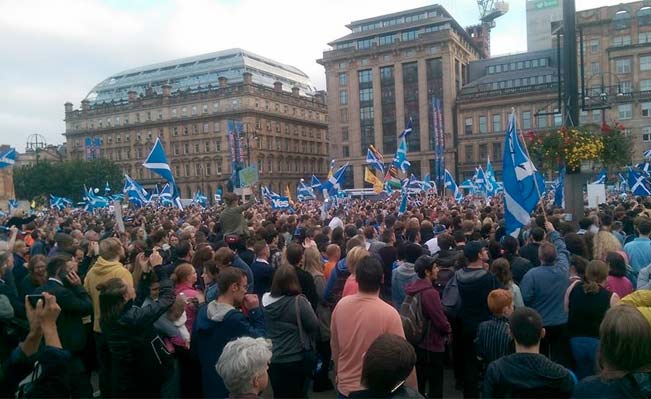 George Square 17 September. Photograph: Chris Walsh
George Square 17 September. Photograph: Chris Walsh
Lindsey German looks at what impact the vote results will have on Britain and Scotland
1The end of the old order. This is virtually inevitable whatever the outcome. If yes, the British ruling class is thrown into the worst crisis it has seen for decades and the greatest constitutional crisis for 100 years when even a limited democracy was forced to confront the House of Lords. If no, the promise of greater devolution for Scotland will on the one hand lead to right wing grumblings that too much has been given away, and on the other hand a demand from many on the left that there should be democratic reforms and greater control of the destiny of ordinary people in England and Wales.
2This is not about a narrow nationalism. There is clearly a significant class element to the vote, with many working class Scots voting yes who normally do not vote at all. Their desire is for greater equality and social justice.
3The breaking of significant sections of the working class from Labour. Indeed, Labour’s biggest crisis may well be not the loss of 40 odd MPS if the vote goes yes, but the loss of its base within the Scottish working class as a whole. Labour has long relied on passivity to endorse its rule in Scotland. Shaken but not stirred by the SNP, it has seen huge swathes of its supporters vote yes. Many will not forget its collusion with Tories, UKIP, big business and the banks.
4The rise of a new left in Scotland. The campaign for yes has been the most energising and dynamic that anyone can remember. It is young and in many cases wants much more fundamental change. Whatever the outcome, this is a social movement which can and must organise round a range of issues which have informed the yes campaign, from austerity to Trident. Socialists within the campaign are well placed to create new organisations which can reflect these priorities.
5The working class in Scotland rediscovering its voice. It is not the voice of the official movement but the awakening of the working class areas and the desire to vote for change will lead to other sorts of organisation and confidence to fight on different questions. The Labour Party and trade unions will be left behind if they do not recognise this fact.
6The ruling class in Britain has been rocked by this campaign. It has thrown everything at achieving a no vote. Even if it succeeds, its undemocratic ruthlessness in defence of its privilege has been exposed for all to see.
7The British political elite has no real clue about the concerns of ordinary people. It thinks it can rule forever, buttressed by obsequious newspapers and BBC, and trapped in a wealthy and privileged world which sets it out from those it supposedly represents. David Cameron, a creature of this elite, is politically almost certainly finished, even with a no vote. But his collaborators should be shaken to the core by this campaign, because it is an indictment of them all, including the supposed outsider Nigel Farage, whose anti immigrant, little England nationalism has been exposed and rejected. He has shown that he supports the establishment up to the hilt.
8The campaign has spilled over the border, and has energised many who have despaired of a new left politics. It will have consequences for us all. Apathy has turned into activity in Scotland and can do so elsewhere. People are voting in such numbers because this is an issue which concerns them, and where they think they can make a difference. One TV journalist said that the only thing this reminded him of was the campaign against the Iraq war in 2003, where people also believed that their personal action was important.
9The yes campaign has achieved all that it has with a grassroots campaign. When people are determined and organised, and when they pick the right issues, they can fight even the most powerful and win (and even if they lose everyone knows this is not the end of the story).The neoliberal consensus at the top is fragile and unpopular. The yes movement is in many respects a movement against this consensus. It can be an inspiration to those of us who want to change the world.
10If there is a yes the Scottish establishment will reconvene and this will mark a division within the yes camp between the politics broadly represented by the Radical Independence Campaign and those of the SNP. The importance of socialist politics and organisation will be central to building future movements (including with working class no voters) and building an independent pole of attraction.

